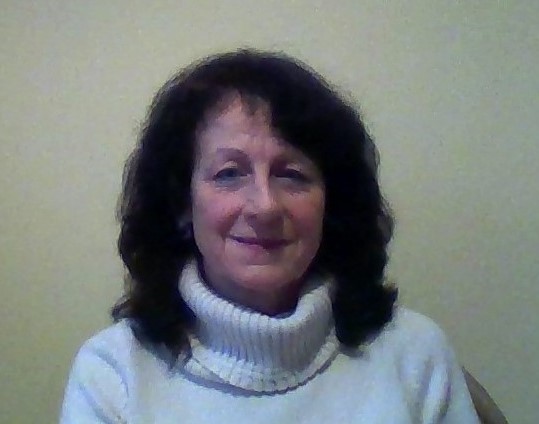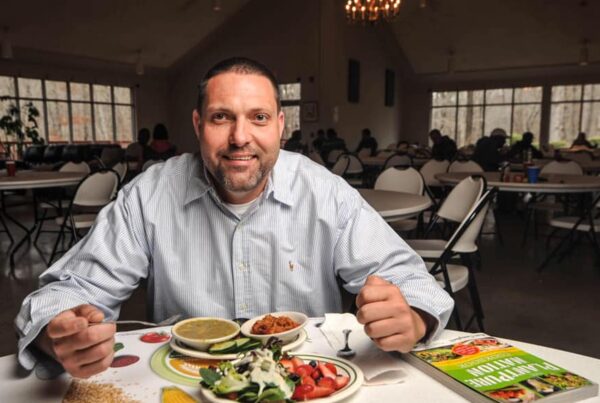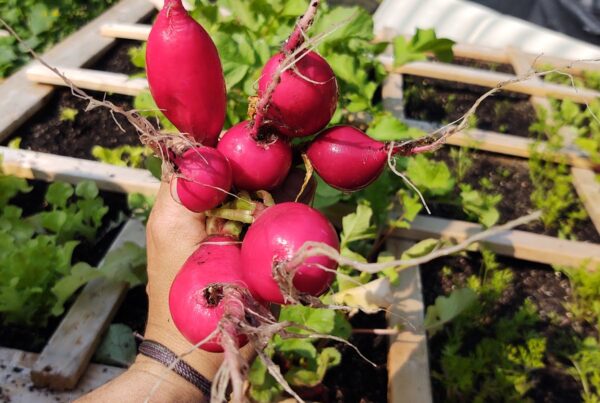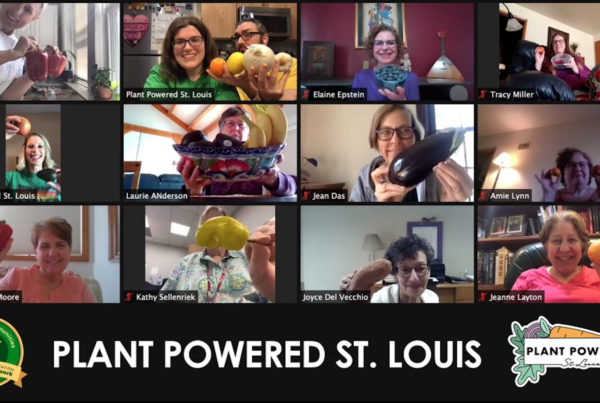In 2021, PlantPure Communities (PPC), created a Pod Advisory Committee (PAC) composed of 10 dynamic Pod leaders, with the goal to ignite, transform, and enrich PPC’s endeavors to create vibrant global change. In the following news story, you will meet 2021 PAC member Deborah Davies, from Wales, UK, and will learn more about the creation and development of her Pod. This interview series was created by PAC member and Plant-Based DFW Pod Leader Maya Acosta. We’re grateful to Maya for highlighting the PAC members in this way! Read more about the PAC here, and watch video interviews with other PAC members shared in this playlist.
The following interview was condensed for length and clarity.
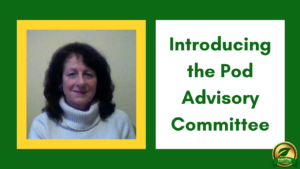
Maya: Tell us a little bit about your involvement with the PAC. Are you part of any subcommittees?
Deb: I’m part of the social action subcommittee [which] creates change in human dietary patterns, by expanding awareness of the impacts of our food choices beyond the Pods. This is achieved by encouraging and supporting Pods to integrate social action into their practice, and organizing joint efforts between Pods. Examples of social action could include partnering with local environment groups and community serving organizations, media advocacy, and promoting change through local government action. And the one that interests me greatly is networking with vegan groups. I do this in my Pod, Plant Pod Cymru. Whenever we have an activity or a meetup, I post on the sites of Welsh vegan groups on Facebook. And in that way, we get new members, and we inform them of the whole food, plant-based diet. [Other activities include] working with food pantries, organizing letters to the editor, and outreach to environmental groups and organizing campaigns, programs, and events to raise awareness about the many benefits of the whole food, plant-based lifestyle.
Maya: So I was interested in knowing how you learned about veganism, and which came first, your veganism or your plant-based nutrition interests?
Deb: Well, I became a vegetarian about 25 years ago for ethical reasons. But at that time, I actually didn’t know anything about factory farming. And when I later found out about it, I was so shocked and horrified, that I became an activist. The more I learned, the more I moved towards veganism. But I didn’t actually become totally plant-based until I read Dr. T. Colin Campbell’s work The China Study where I learned that eating animal products is harmful to us. And that gave me the impetus to make the leap to go 100% plant-based. Part of my campaigning was acting as a volunteer school speaker for an organization called Animal Aid. I used to tell the pupils ‘we don’t need meat’. It was a wonderful revelation on reading Dr. Campbell’s book, to learn that not only do we not need animal products, but they are not our natural fuel and cause us harm. And so that filled me with determination to find out more. I watched PlantPure Nation, the documentary by Nelson Campbell, Dr. Campbell’s son, and was totally inspired by it. At the end, when Nelson asks us to join his grassroots movement, I thought, yes, I want to do that, I want to be part of this. So I set up Plant Pod Cymru.
Maya: How difficult was it for you to start your Pod?
Deb: I didn’t find it difficult at all. I was very fortunate because I started the Pod in September 2019 and two months later, I was joined by Angela Hill, who has a background in education, as co-group leader. Dr. Sue Kenneally, who is a medical doctor and nutritionist, and on the advisory board of Plant-Based Health Professionals UK, is also a key person in the group. I think having a core of committed people like that gives credibility to our group. We found that people were keen to join us. But I must say we don’t really focus on animal issues, per se, we focus on health, on the grounds that I think it will encourage a lot of people who perhaps aren’t attracted by ethical reasons to change their diet, because it’s good for their health and good for the planet. My activism takes place outside of the Pod.
Maya: I guess I can assume, knowing a little bit about the statistics in terms of health and weight issues, that the UK faces very similar issues to us here in the United States. So I can see how in many ways, coming from a health perspective, the community would be a little bit more open, right? What was your first event?
Deb: We held a meetup in a vegan restaurant, and I was quite pleased that 11 people turned up for the first meeting. It went quite well with everyone chatting and interacting. The next event was more structured – Dr. Sue Kenneally gave us a talk. Another medical doctor who is a member of the group gave a talk on a different occasion. We like to try and introduce a theme and at one event, focusing on the Game Changers documentary, a member of our Pod who is an athlete talked to the group. Since COVID, we have met online and obviously, there’s disadvantages to that. But there’s also advantages – our Pod is the only one in Wales and we’ve got members from all over the country. So members have been able to join us virtually who wouldn’t be able to attend a live meeting.
Maya: So tell us about that experience. Once you transitioned to online outreach, I guess you can say you started hosting guests on Zoom, and you had Dr. Klaper speak to your group as well.
Deb: Yes. Dr. Sue Kenneally knows Dr. Klaper as a colleague and friend, so she approached him and asked if he would address our group. And to our amazement, he said yes. It was a bit of a challenge to organize that, especially getting to terms with Zoom webinars, etc. Fortunately, PlantPure Communities offered to host the event so that simplified things. We were thrilled to have such a world renowned doctor talk to us. He gave a presentation, followed by a question and answer session. He was very charming, as usual and it was a great success. Following that, we were then able to put on another virtual talk with a British plant-based doctor and author, Dr. Gemma Newman. She gave a brief talk followed by in-depth questions and answers back in March this year [2021]. We were able to do that without support from PPC. It also went well and was recorded and put on YouTube, etc.
Maya: Did you see an opportunity to outreach and to really emphasize how important it is for us to take care of our health because of COVID-19? For example, some of the comorbidities that put people at a higher risk for complications, should they get COVID-19.
Deb: Well, in the last year [2020] we actually wrote to the First Minister of Wales regarding the role a whole food, plant-based diet could have in combating COVID-19. PlantPure Communities had approached us and asked us if we would work with them and write to the Prime Minister of Britain. But we pointed out it might be a good starting point to write to the Welsh First Minister (because Wales has devolved powers for health). The letter was publicized by PPC in the media. We were very happy to be involved in such activism.
Maya: If people are interested in either becoming a Pod leader or starting their own Pod, do you have advice? Is there something that you could recommend to get started?
Deb: Well, I watched a webinar that PPC had made, featuring two successful Pod leaders, and they explained how they had set up their Pods and what activities they carried out and the success they’d achieved. And that inspired me and gave me the confidence to try it for myself. I thought, yes, I can do that. It is useful if you can get at least one other person to work with you and to give you moral support. It also lends credibility – the more people involved. Getting professionals on board as well, would be useful.
Maya: Thank you for saying that because I actually think that’s very important. Do you want to talk at all about your activism and share with the audience why it’s important for you to be an advocate for animals?
Deb: Yes, it is very important because after the Second World War, there was a move towards industrialized farming, and animals were no longer treated as if they were sentient, but treated like commodities, with an ethos of profit at all costs. It’s big business and very cruel. The animals are, in my opinion, mentally and physically tortured. Some people believe that slaughter can be humane but I don’t think so. They know, they can smell fear, they can hear the cries of the other animals, and it’s quite a terrifying prospect for them. And science has proven that animals are sentient. They have feelings very much like ours. They feel fear, and they feel pain. The mass use of animals in farming is totally unnatural and should be brought to an end.
Maya: I absolutely agree. So are there any other movies that you would recommend?
Deb: What The Health explains how plant food provides the optimal diet. Also, I’d recommend Cowspiracy. Both films use humor and are easy to view despite their serious message. There are more serious films such as Dominion. And of course, PlantPure Nation, which explains the genesis of this movement.
Maya: Let’s share your contact information.
Deb: We use Facebook as our main platform. We hope to provide a place where people who are eating whole food plant-based, transitioning, or interested in doing so can interact. The content varies from recipes and cooking tips to articles on nutrition, links to videos, and that sort of thing. We occasionally do book reviews. But we also want to encourage people to go in deeper so we give links to webinars, summits, training courses, etc. We try to get really engaged with the subject and keep up to date with the science and know what’s going on in the plant-based world generally.
Maya: Do you have a final message? Anything else that you might have wanted to cover?
Deb: I’d like to say that belonging to a community of people who share the dream of healing the world has given a new dimension and a new cause to my life, in addition to that of fighting to protect the animals. We all need to realize that industrial farming is not sustainable and it’s cruel, and that our reliance on animal foods is the cause of many of the ills that we are facing in the world today such as climate change, destruction of the environment, loss of species, loss of habitat. All these things are interconnected and they’re all linked to livestock production. They can all be addressed by wide scale adoption of a whole food plant-based diet.
Maya: Yes, absolutely. And that’s why Pods like yours are part of PlantPure Communities. They all exist to help educate the community, the audience, about how animal agriculture can affect all areas, our health, the environment, and of course, the animals.
Deb: I’d just like to say as well that the power is in our hands. It is up to us and we can make a change – people power does work.
Find Deb’s Pod on Facebook to further engage with the plant-based movement in Wales!
